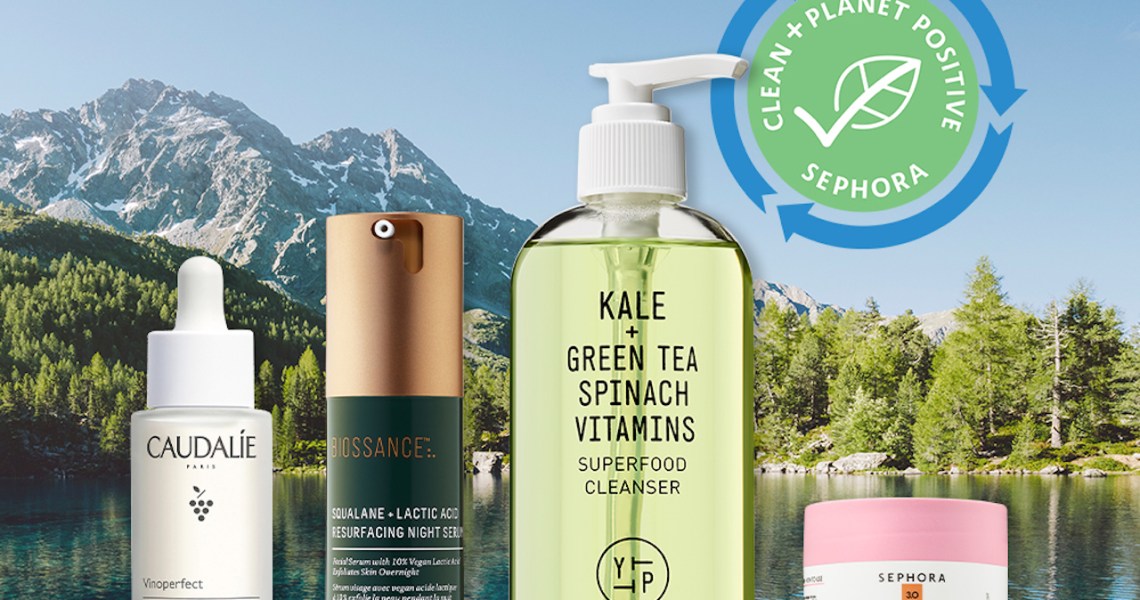Sephora is officially adding a new category of products to its merchandising; It’s expanding its Clean at Sephora program to include a subcategory of sustainable products called Clean + Planet Positive.
Clean + Planet Positive launches Thursday with 18 brands, including Farmacy, Biossance, Youth to the People, Tata Harper, Selfless by Hyram, REN, Briogeo and Sephora’s own Sephora Collection brand. For now, brands must adhere to Sephora’s clean standards to also receive Planet Positive labeling, the latter of which requires packaging reduction targets and environmental charitable giving, among other criteria. Sephora established its Clean at Sephora program in 2018 with 50 brand partners and a “formulated without” list of 13 ingredient categories. Today, there are over 90 brands within the category and over 50 ingredient categories on the “formulated without” list. The Clean at Sephora program and Clean + Planet Positive labeling are only available in the North American market.
“The [significance of Planet Positive is] in the global nature of our of our partnerships — how meaningful Sephora is to a lot of brands and the beauty community, and to new brands that want to be sold at Sephora,” said Cindy Deily, Sephora’s vp of skin-care merchandising. “If other retailers implement something like this, or if this starts to have an impact on the mass channel in beauty, that’s great. Part of where our responsibility as a leader in beauty is that we need to make changes.”
Planet Positive criteria is broken down into four buckets that all brands need to reach: packaging, ingredient sourcing, environmental charitable giving and overall climate commitments. Requirements include increasing curbside recyclable products, reducing the empty space in shipped products and implementing internal reduction targets for all existing primary and secondary product packaging. They also include eliminating single-use items in products being sold, as well as in marketing and publicity outreach, among other efforts.
Retailer sustainability efforts first began within the clean and indie company landscape. In 2020, clean retailer Credo committed that it would eliminate single-use masks and wipes and that its brand partners would be required to use 50% post-consumer recycled plastic or other sustainable materials by June 2023. Also in 2020, Detox Market made its own sustainability commitments that equated to a reinvestment of 2% of the company’s revenue.
Then, in March, Ulta Beauty announced a partnership and dedicated website with recycling company Loop, allowing customers to shop specific brands and products on LoopByUlta.com and send back their empty packages. In 2020, with the launch of its Conscious Beauty program, Ulta Beauty also committed that all packaging sold from all brands will need to be made from 50% post-consumer recycled or bio-sourced materials, or able to be recycled or refilled, by 2025.
Sephora’s own sustainability goals shared in 2019 predominantly focused on the retailer’s stores, distribution centers and corporate offices. The retailer is part of the independent organization called the Sustainable Packaging Coalition and noted in its sustainability goals that it “encourages” brands to “embrace efficient [packaging] design,” but doesn’t make it a requirement. Since late 2019, Sephora has piloted an in-store recycling program in Utah and Colorado. Customers who bring back three containers from any brand receive a 15% discount on Sephora Collection products. Previous Glossy reporting cited a Sephora spokesperson saying there had been no changes or expansions to the pilot as of 2021.
Ad position: web_incontent_pos1
Deily said that, at the onset of Clean + Planet Positive, Sephora is acknowledging the brands that have put in considerable effort to become more sustainable. But, she said, Sephora plans to push the larger beauty industry, as part of the program’s future.
“It’s a way for us to spotlight this group of brands. We did have to work with some of them [to reach Planet Positive labeling]; they didn’t all pass with flying colors,” she said. “But [we also] want to put pressure on the entire industry, including ourselves, to do better. We all have a long way to go, and we hope that by building something like this, the larger community will take note and work toward compliance and earning this seal.
Deily said that clean can be a “complicated” term. Given the criteria for “clean” can differ based on an individual retailer or brand’s definition, adhering murky language to an equally complex subject matter like sustainability could lead to misinformation. Sustainability, after all, comes with its own definitions and criteria. But the two are not entirely mutually exclusive; ingredients like oxybenzone are unsafe for coral reefs. At the same time, plastic microbeads are harmful to aquatic life, among other concerning ingredients ending up in drinking water.
“It’s encouraging to see a growing consciousness around practices, ethics and sustainability in the beauty space,” said Marina Mansour, Kyra Media head of beauty partnerships. “However, clean beauty is a young subcategory of beauty, and with the growing focus, we need to maintain transparency [around] what it means to be ‘clean’ to avoid misleading consumers and greenwashing. If the definition of clean beauty is broadening, then an industry-standard certification, like [the cruelty-free] Leaping Bunny organization, for example, is needed to aid transparency.”
Sephora will update its e-commerce site and app with a landing page to display the new program and Clean at Sephora, on Thursday. Sephora plans to expand the level of detail around the criteria and the ingredient list for both Clean at Sephora and Clean + Planet Positive within that landing page. Sephora hosted an educational webinar for its sales associate staff on Tuesday to walk them through the program.




